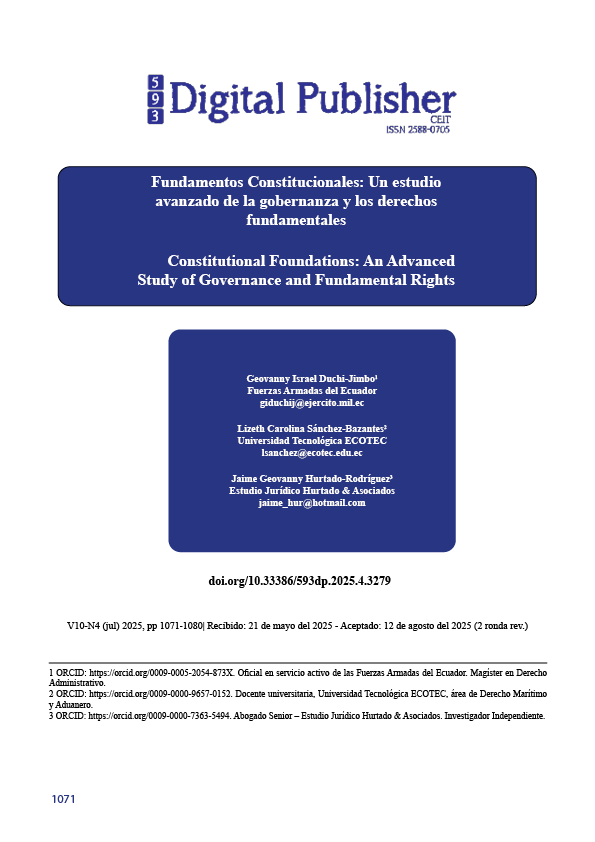Constitutional Foundations: An Advanced Study of Governance and Fundamental Rights
Main Article Content
Abstract
The main objective of this article is to conduct an advanced study of governance and fundamental rights. The methodology used was bibliographical, with documentary support and an epistemic approach. Sources from scientific journals, books, and other academic publications were analyzed using Google Scholar through a documentary analysis matrix with the selected sources. The results are presented clearly, confirming that at least all member states of international organizations that recognize fundamental rights maintain a position of respect and a willingness to use legal mechanisms to achieve full respect for these rights. Furthermore, governance is used to achieve these objectives through the modernization of its tools and procedures.
Downloads
Article Details

This work is licensed under a Creative Commons Attribution-NonCommercial-ShareAlike 4.0 International License.
1. Derechos de autor
Las obras que se publican en 593 Digital Publisher CEIT están sujetas a los siguientes términos:
1.1. 593 Digital Publisher CEIT, conserva los derechos patrimoniales (copyright) de las obras publicadas, favorece y permite la reutilización de las mismas bajo la licencia Licencia Creative Commons 4.0 de Reconocimiento-NoComercial-CompartirIgual 4.0, por lo cual se pueden copiar, usar, difundir, transmitir y exponer públicamente, siempre que:
1.1.a. Se cite la autoría y fuente original de su publicación (revista, editorial, URL).
1.1.b. No se usen para fines comerciales u onerosos.
1.1.c. Se mencione la existencia y especificaciones de esta licencia de uso.
References
Arce, C. (2022). Desafíos para la ciudadanía y el sistema de derechos fundamentales en la era digital. Derechos y Libertades(46), 241-272. doi:https://doi.org/10.20318/dyl.2022.6520
Avalle, G. (26 de Junio de 2023). https://www.derechosdigitales.gob.es/sites/default/files/2025-03/11.pdf https://www.derechosdigitales.gob.es/sites/default/files/2025-03/11.pdf Gobernabilidad y gobernanza. Enfoques en tensión. Estudios Políticos (66). doi:https://doi.org/10.17533/udea.espo.n66a02
Caldera, J., & Rosell, R. (2023). ¿Que son los derechos fundamentales? una respuesta desde el constitucionalismo humanista. Human Review, 7 - 18. Recuperado el 2 de Mayo de 2025, de https://philarchive.org/archive/ECAQSL
Castillo, L. (7 de Julio de 2023). El contenido Constitucional de los Derechos Fundamentales Como Conjunto de Normas Constitucional. Athina(15), 29-52. doi:https://doi.org/10.26439/athina2023.n015.6483
Céspedes, V. (10 de Septiembre de 2024). Revolución tecnológica e inteligencia artificial en el Estado Constitucional. Juristemas(8), 31-47. Recuperado el 3 de Mayo de 2025, de https://rai.uapa.edu.do/bitstream/handle/123456789/2671/Art%202%20Juristema-2024.pdf?sequence=1&isAllowed=y
Díez, S. (25 de Febrero de 2025). Universidad Autònoma de Madrid. Recuperado el 3 de Mayo de 2025, de Universidad Autònoma de Madrid: https://www.derechosdigitales.gob.es/sites/default/files/2025-03/11.pdf
Glückler, J., Rehner, J., & Handke, M. (2019). Gobernanza, redes y territorio. Revista de Geografia Norte Grande(74). doi:http://dx.doi.org/10.4067/S0718-34022019000300005
Ibáñez, S., Casadiegos, M., & Machado, M. (Agosto de 2024). Análisis integral del marco jurídico de los derechos fundamentales en Colombia. Revista Formación Estratégica, 9(1). Recuperado el 3 de Mayo de 2025, de https://www.formacionestrategica.com/index.php/foes/article/view/148/111
Maza, J. (2019). Los derechos humanos y la agenda 2030. Copenhague: Instituto Danés de Derechos Humanos. Recuperado el 3 de Mayo de 2025, de https://www.humanrights.dk/sites/humanrights.dk/files/media/migrated/lessons-learned_spanish_web.pdf
Murillo, F., & Herrera, C. (2024). Gobernanza y derechos constitucionales de los grupos de atención prioritaria. Polo del Conocimiento, 9(8), 1709-1731. doi:https://doi.org/10.23857/pc.v9i8.7785
Naciones Unidas. (2024). Naciones Unidas. Recuperado el 3 de Mayo de 2025, de https://www.ohchr.org/es/good-governance/about-good-governance
Palacios, J., Toledo, M., Miranda, E., & Flores, A. (2021). Políticas públicas y gobernanza participativa local. Revista Venezolana de Gerencia, 26(95), 564-577. doi:https://doi.org/10.19052/rvgluz.27.95
Querejazu, A. (2020). Comprendiendo y cuestionando la gobernanza global. Colombia Internacional, 63-86. doi:https://doi.org/10.7440/colombiaint102.2020.04
Romero, M. (Julio de 2021). Revision sistematica del concepto de gobernanza cooperativa. Ciencias Administrativas(18). doi:https://dx.doi.org/https://doi.org/10.24215/23143738e083
Tejada, E. (27 de Noviembre de 2023). La interpretación de los derechos fundamentales: una aproximación a sus límites. Revista IURIS FORUM(5), 26-71. Recuperado el 2 de Mayo de 2025, de https://www.pucmm.edu.do/publicaciones/Documents/revista-iuris/art4-interpretacion-derechos-fundamentales.pdf




